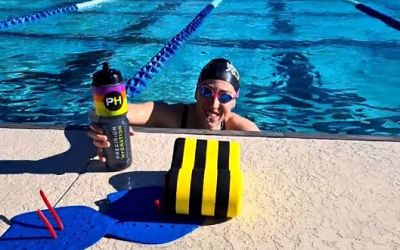India Lee is the latest pro triathlete to join the Precision Hydration team and we spoke to India to find out what she's focusing on in training after making the move from Olympic-distance triathlons to IRONMAN 70.3...
Hey India, welcome to Team PH! You've made the step up to middle-distance racing recently, so what have been the key changes you’ve made to your training program since moving to 70.3 distances?
I’m being coached by Rhys Davey, and have been since moving to Bath 3 years ago. Originally I moved here as part of the British Triathlon World Class Performance program, but have chosen to stay here after stepping up to 70.3 racing.
The key changes around my training are mostly including more longer tempo sessions on the bike and run. I'm focusing on my efficiency on the bike and strength on the run.
I wouldn’t say there's a lot of difference between Olympic distance and 70.3 training, it’s just the technical stuff like position on the bike while riding at race power that needs more attention.
So what does a 'typical' week of training look like at the moment?
My typical week is usually around 30 hours of training. Looking something like this:
| Day | AM | PM |
|---|---|---|
| Monday | Long aerobic swim / 1 hr easy run | 2 hour easy bike / Gym |
| Tuesday | Easy run / VO2 Swim | Threshold Run |
| Wednesday | Long aerobic swim / 4 hr Bike | 75 min run |
| Thursday | Sprints swim / 45 min run | Race pace bike session |
| Friday | Threshold swim / 30 min run | Gym |
| Saturday | Short run reps / 4 hour bike | 30 min run |
| Sunday | 4 hour bike + threshold | Long run |
You train with a group of elite athletes in Bath and we wondered how you select your main training hub. What is it about Bath that appeals to you over somewhere like Loughborough for example?
I chose Bath as my main training hub because it offered me an elite environment with world class facilities, training partners with similar values to me, while being in a beautiful part of the world.
It's important to me to be in a place where I enjoy spending time, and an area in which I look forward to riding my bike and running around.
We have a much smaller training group than centers such as Loughborough or Leeds, which is also something that attracted me to Bath. Not getting lost in a crowd means our sessions can be adapted and individualised for us to get the most out of it rather than just getting it done.
What have you found are the key differences between training as part of a squad and under your own steam?
Training as part of a squad can be a great environment to be in. When there’s a group of you all working as hard as each other it makes it easier to get out the door or to get a little bit more out of yourself. Training camps with a squad are great fun.
Training under your own steam requires more self-discipline and internal motivation. Some days the hardest part is just getting out the door for a run, but you know you have to do it. I’ve spent a lot of time training on my own in the past, and really enjoy the freedom it allows you. You have more flexibility to move sessions around as you need to.

Fantastic, so now you've made the step up to IM 70.3, what are your ambitions for the next 5 years?
My ambition over the next 5 years is to step up to IRONMAN and be competitive over that distance in championship races. If I'm to achieve this, I need to build on the consistency I’ve achieved over the past couple of years and be patient.
I trust the people I am surrounded by and believe it’s possible.
Your performance when finishing in the top-20 at Challenge Daytona - where you were up against the best triathletes in the world - must give you great confidence. How prepared did you feel for the conditions and the unique race distance (2k swim, 80k bike, 18k run)?
I felt really well prepared for the conditions in Daytona. We knew it was going to be a flat course that required riding in the most aero position possible for close to two hours.
Before the build up to Daytona I hadn’t focused much on my aero position, mainly because I was new to riding a TT bike and I was focusing on getting stronger rather than the intricacies of my aerodynamics.
I spent hours tinkering with my position, and then hours riding in that position on the turbo. That being said - I don’t think I was fully prepared for just how relentlessly tough the course would be in Daytona.
It would be great to race there again next year as I think I would do a few things differently to prepare.
You also work as a Female Athlete Mentor with KOTWF - how have your own experiences influenced how you approach mentoring other athletes?
Working as a female athlete mentor is something I really enjoy. I’ve been in elite sport for a long time, I’ve seen a lot and learned a lot along the way. Being in a position to pass along and use that experience to help other athletes is important to me.
Whether that be giving perspective to an impatient junior athlete or offering support to a fellow elite going through a tough injury, it’s cool to be able to be there for people trying to achieve their goals.